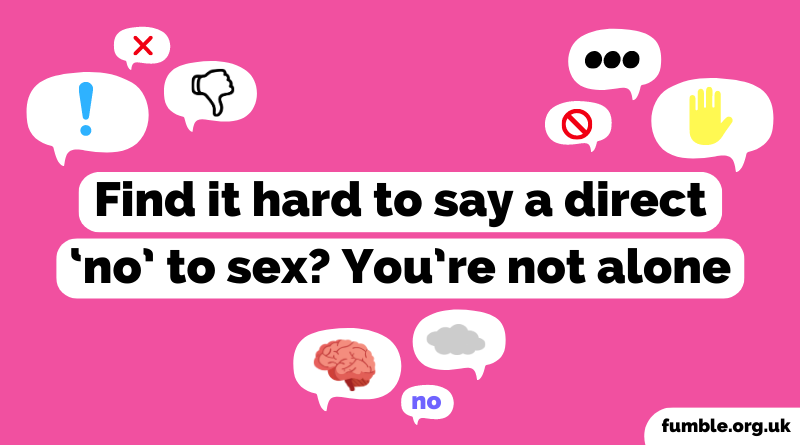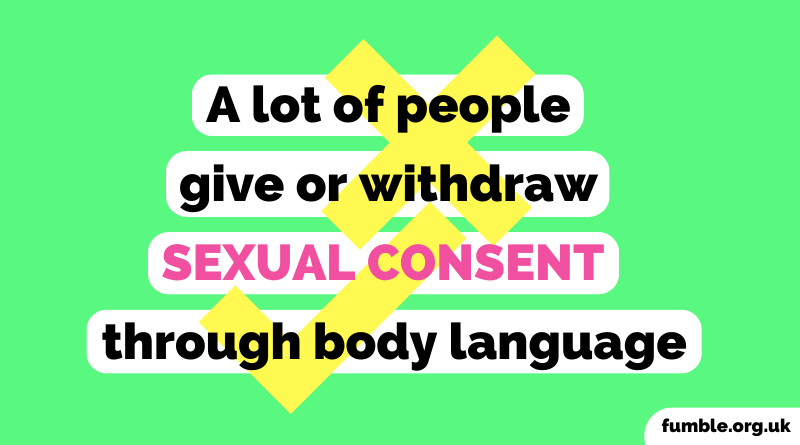Is sexual consent more complicated than a ‘yes’ or ‘no’?
Why all this talk about sexual consent if it’s just about a yes or a no?
Here at Fumble, we’re all about discussing sexual consent. And quite rightly – sex can only be pleasurable and fun if everyone consents and wants to have sex. So that’s simple, right? Just say yes or no, depending on what you both want.
Except it can feel a bit more complicated than that in real life.
Jump straight to our Getting help section below if you want to access support around any experiences of sexual violence and unwanted sexual behaviour.
What does ‘consenting’ actually mean?
Let’s start with the dictionary definition of ‘consent’. This defines consenting as ‘complying’ and ‘yielding’: it’s something we’re willing to do, but we don’t really want to do it. For example, we go to school on a Monday morning because we know it’s necessary if we want a specific job. We’re willing to do it, whilst not wanting to crawl out of bed that particular morning. But how helpful is this definition when it comes to sexual consent? Sex shouldn’t be something we’re willing to do but don’t want to. Sex is about what we actively want because it feels good.
What about when it comes to the law?
Sexual consent, under the law, is the agreement between people to have sex (and that includes all the different kinds of sexual intimacy). That means having the freedom, capacity and choice to make a decision.
But this phrasing doesn’t properly distinguish between wanting sex and giving in to sex. And what exactly does it mean, to have the freedom, capacity and choice to make this decision? What about if we’re drunk? Or if we’re feeling pressured? If we’re afraid of the other person? Or if we don’t want to reject them? What if our friends are pressuring us to ‘lose our virginity‘?
In real life, sexual consent can feel much more complicated than what the law says. It can feel tricky to work out what we want when it comes to sex. And, even if we know what we want, we may struggle to put it into words. Sometimes people might go along with sex, when they don’t actually want it. For example, they might feel the pressure to always ‘be up’ for sex (especially the case for boys and men), they might not want to hurt their partner’s feelings, or they might find it hard to say no.
Saying no
Most of us know that we have the right to say ‘no’ to sex at any point. Whether you’re in a bar, heading upstairs, getting under the covers, or even in the middle of having sex, you can change your mind and tell your sexual partner. But how easy is it to say something?

Even if you know it’s your right, it can be very difficult to voice. Even if they’re a partner of many years and you feel really comfortable with them, it can still feel tricky. Sometimes it can feel easier to be blunt with someone you hardly know at all?! What’s all that about?
A lot of people struggle to say ‘no’. British society is known for its ‘polite’ excuse-making. For example, it’s common (and often expected!) to make an excuse if we’re invited to something we don’t want to go to: “Sorry, wish I could but I’ve got a family thing that day…”
It’s rare to say a direct ‘no’ to something non-sexual. So no wonder it feels hard when it comes to sex! Rejection usually cuts deeper when it involves someone you have feelings for. Instead, it can often feel a lot easier to say ‘no’ without being so direct.
We know that, although it’s common to find it difficult to say ‘no’, some people can find it even harder because of past experiences they’ve had. For example, if you’ve experienced sexual violence in the past, or had any experience where someone has carried on during sex, despite you saying you wanted to stop or that you didn’t feel comfortable. This can make it particularly difficult to withdraw consent and put it into words. If you’re struggling with setting boundaries around sexual intimacy, reach out for support. You don’t have to manage this alone.
So, if it’s hard to say ‘no’, how can I trust my partner actually wants to have sex?!
Yes, this can feel tricky if you want to suggest having sex to your partner. One way to make it easier for the other person, especially if you know they struggle to be direct, is to give them the opportunity to say no indirectly. Ask them an open question that gives an alternative to sex, for example:
- “Do you want to come back to mine or shall we stay for another drink?”
- “Do you want to head to bed or we could watch something?”
- “Do you want to stay up a bit, kiss and stuff, or are you tired?”
This can feel a lot easier for someone to respond to, because they’re still picking something you’ve suggested and it doesn’t feel like an outright ‘rejection’. (It’s great if you can be forthright when talking about sex, but we also know that a lot of people use phrases to mean ‘sex’, so our examples are less direct.)
Understanding body language
Being able to read your partner’s body language will also help you to understand how your partner is feeling. This is also where enthusiastic consent comes in. It means: someone is saying through their body language, words and expressions that they’re enjoying sex, they want it to continue, and they’re therefore consenting.

It’s understandable to feel frustrated at the fact sexual consent isn’t as simple as saying yes/no. But actually this ‘complication’ taps into an incredibly important point: getting consent is the bare minimum of what we should be doing when it comes to sexual intimacy with someone.
Whether you’re in a long-term relationship with this person, or it’s a more casual hook-up, you should be trying your best to make the other person feel as comfortable as possible, and aiming to give them the best time you can (though, that doesn’t mean doing things you don’t want to do!). We can do this by:
💚 Giving them the opportunity to say ‘no’ (examples above)
💚 Taking the time to understand their body language
💚 Checking in to make sure they’re enjoying what’s happening. For example, “How’s this? Slower?” or “Does this feel okay?”
💚 Listening to them: there are lots of ways we communicate ‘no’ or ‘stop’ indirectly
The more thought that goes into communication, building trust and considering each other’s feelings, the better the sex will be, and the more fun you’ll have together. Ultimately, sexual consent is about care and checking in.
So is sexual consent more complicated than a ‘yes’ or a ‘no’? Yes, absolutely. But that’s because a yes/no is the lowest bar of what needs to happen before sexual intimacy, rather than what will actually make sex fun and enjoyable.
Getting help
If you’ve experienced any unwanted sexual behaviour or any kind of sexual violence, there are places you can go for help and support. You don’t have to manage this alone. There are specially trained professionals, who want to help, and you can disclose as much or as little as you feel comfortable.

Other support
- Sex and mental health: How could it be affecting me?
- How to communicate during sex
- Brook – How to give and get consent?
- Brook – Having great sex (safely!)
Read more
Last Reviewed 10 May 2023
Image Credit: David Watkis via Unsplash





